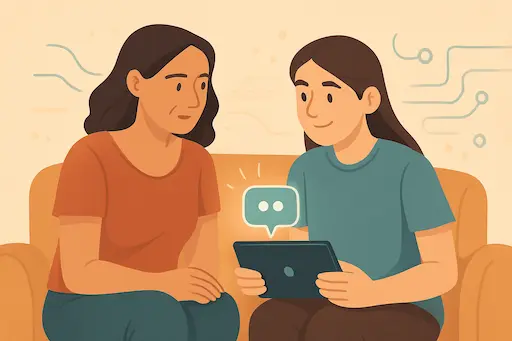What AI Really Is (and Isn’t)
What’s the deal with AI, really?
AI is everywhere these days — in your newsfeed, on your kids’ homework help app, even inside your photo editor. But what is it actually doing? And more importantly: what isn’t it doing?
In a world full of headlines that sound like science fiction, it helps to take a breath and start from the beginning.
Let’s unpack what AI is, what it isn’t, and why that matters — especially for families.

Lets discuss what AI really is.
AI ≠ Intelligence
Despite the name, most modern “AI” tools aren’t actually intelligent in the way humans are. ChatGPT, for example, isn’t thinking, feeling, or understanding. It doesn’t “know” things the way you or I do.
Instead, it’s a large language model — a system trained to predict the next word in a sentence based on a massive amount of text from the internet. Think autocomplete, but way more advanced.
It’s not making decisions. It’s following patterns.
AI ≠ Truth Machine
One of the biggest myths about tools like ChatGPT is that they always give correct answers. They don’t.
They can sound confident even when they’re completely wrong — like a student writing an essay on a book they haven’t read. The writing might look polished, but the facts can be fuzzy, outdated, or entirely made up.
Just because it sounds smart doesn’t mean it’s right.
That’s one of the first lessons to teach kids (and ourselves!) when using AI tools.
AI ≠ Human Replacement
There’s a lot of hype about AI replacing workers, teachers, writers — even parents. While it’s true that some jobs and tasks are changing, most current AI tools are best seen as assistants, not replacements.
They’re fast. They’re helpful. But they’re not thoughtful in the way people are.
They don’t have ethics. Or judgment. Or life experience.
That’s where you come in.
So What Is It Then?
In plain terms:
- ChatGPT: Advanced text predictor
- DALL·E and image generators: Pattern-based digital artists
- Whisper and audio tools: Efficient transcribers
They’re tools — not magic.
Useful? Absolutely.
Trustworthy by default? Not always.
Your Takeaway: Use with Eyes Open
You don’t need to be a tech expert to use AI tools wisely.
Start by seeing them for what they are: impressive assistants that need supervision.
Ask questions. Double-check their answers. Think of them as helpful-but-clueless interns.
And as always: your judgment matters more than their output.
Want more grounded guides like this one?
Join the 7-Day Privacy Bootcamp for short, practical tips straight to your inbox.